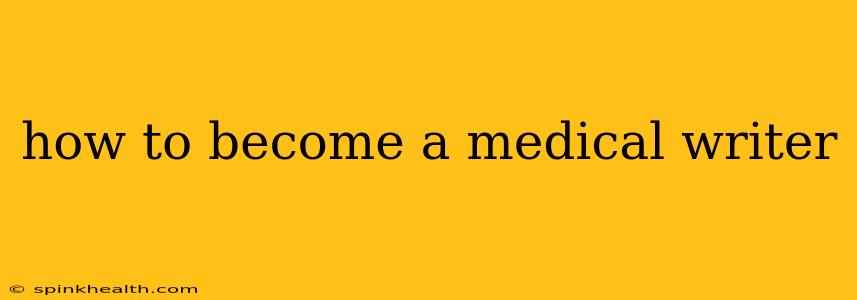How to Become a Medical Writer: A Journey from Aspiration to Accomplishment
The world of medical writing offers a unique blend of scientific rigor and creative expression. It's a field where you can use your passion for words to translate complex medical information into accessible and engaging content. But how do you embark on this rewarding career path? This journey, much like any other, requires planning, dedication, and a touch of perseverance. Let's explore the roadmap to becoming a successful medical writer.
What is Medical Writing?
Before diving into the "how," let's clarify the "what." Medical writing encompasses a broad range of activities, all focused on communicating medical information clearly and accurately. This could involve crafting manuscripts for publication in peer-reviewed journals, developing compelling marketing materials for pharmaceutical companies, creating educational resources for healthcare professionals, or even writing patient-friendly materials. The common thread is the need for precision, accuracy, and the ability to simplify complex scientific concepts.
What Skills Do I Need?
The foundation of any successful medical writer is a strong command of the English language. This extends beyond grammar and spelling; it encompasses clarity, conciseness, and the ability to tailor your writing style to your target audience – be it a physician, a patient, or a regulatory body.
Beyond language skills, you'll need:
- Scientific Knowledge: A solid understanding of medical terminology, research methodologies, and the scientific process is crucial. A background in science or healthcare is advantageous but not always mandatory.
- Research Skills: You'll be constantly gathering information from scientific literature, clinical trials, and other sources. The ability to synthesize this information effectively is paramount.
- Information Synthesis: Medical writing isn't about regurgitating information; it's about presenting it in a coherent and understandable manner. You'll need to analyze data, identify key findings, and weave them into a compelling narrative.
- Attention to Detail: Accuracy is paramount in medical writing. A single mistake can have significant consequences.
- Adaptability: The field of medicine is constantly evolving, so the ability to learn new information and adapt your writing style to different contexts is vital.
How Can I Gain Experience?
While formal education can provide a solid foundation, practical experience is equally important. Here are several avenues to explore:
- Internships: Seek internships with medical communication agencies, pharmaceutical companies, or healthcare organizations.
- Freelancing: Start small, taking on freelance projects to build your portfolio and gain experience. Websites like Upwork and ProBlogger can be good starting points.
- Volunteering: Offer to write for medical charities or non-profit organizations.
- Networking: Attend industry events and connect with professionals in the field.
What Education or Training Do I Need?
A background in science or healthcare can be immensely beneficial but isn't always a prerequisite. While a degree in journalism, English, or communications is a good foundation, many medical writers have backgrounds in biology, nursing, or other health-related fields. Many universities now offer specialized courses or certificates in medical writing, providing valuable training.
What are the Different Types of Medical Writing Jobs?
The diversity of medical writing is one of its greatest appeals. Possible roles include:
- Medical Publications Writer: Preparing manuscripts for publication in journals.
- Regulatory Writer: Creating documents for submission to regulatory agencies like the FDA.
- Medical Communications Specialist: Developing marketing materials for pharmaceuticals.
- Medical Education Writer: Creating educational resources for healthcare professionals and patients.
- Technical Writer (Healthcare Focus): Documenting medical devices and procedures.
How Much Can I Earn?
Salaries for medical writers vary greatly depending on experience, location, and employer. Entry-level positions may offer a modest starting salary, but with experience, the earning potential can increase significantly.
How Can I Build My Portfolio?
A strong portfolio is essential for showcasing your skills to potential clients or employers. You can build it by:
- Writing sample documents: Create sample medical articles, brochures, or website copy.
- Collaborating on projects: Offer to assist more experienced writers on projects.
- Submitting your work to publications: Aim to publish your work in relevant journals or publications.
The path to becoming a successful medical writer requires dedication and a commitment to continuous learning. But the rewards – a fulfilling career using your skills to improve healthcare communication – are well worth the effort.

